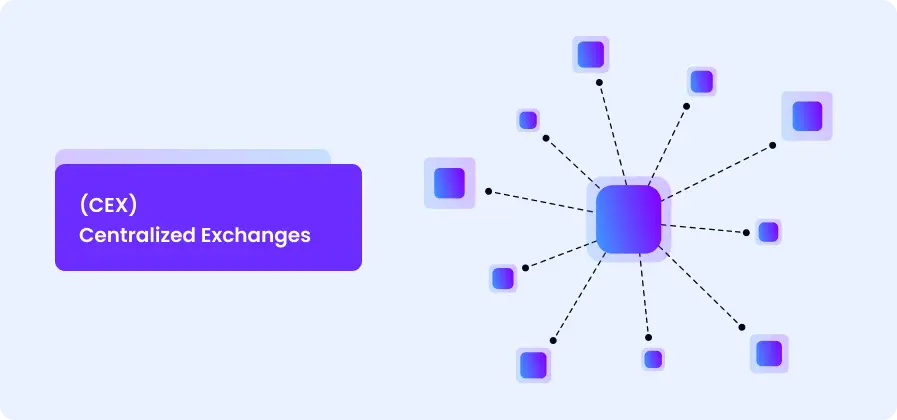Centralized vs Decentralized Exchanges: Exploring Pros and Cons and the Fundamental Differences
The emergence of cryptocurrencies has brought about a revolution in the financial landscape, granting individuals greater control over their digital assets and the opportunity to participate in a borderless, decentralized economy. In the ever-evolving world of digital currencies, one crucial aspect that traders and investors encounter is the choice between centralized vs decentralized crypto exchanges (CEX and DEX). Understanding the fundamental differences between these two types of exchanges is vital for making informed decisions in the rapidly changing realm of digital currencies.
What is CEX? CEX Concept Meaning, Centralized Crypto Exchanges (CEX) and How They Work
So, what is CEX in the crypto domain? Centralized crypto exchanges, also known as CEX, have traditionally been the dominant players in the cryptocurrency market. These cryptocurrency exchanges operate on a centralized infrastructure, meaning they are managed and controlled by a single entity or company. CEX platforms provide users with a familiar trading experience similar to traditional financial markets.
CEX platforms act as intermediaries between buyers and sellers, facilitating the exchange of cryptocurrencies. They typically hold custody of users' funds and require users to create accounts and undergo Know Your Customer (KYC) procedures to comply with regulatory requirements. Users deposit their funds into centralized wallets provided by a cryptocurrency exchange and can then trade a wide range of cryptocurrencies against other digital assets or fiat currencies.

What is DEX? Decentralized Crypto Exchanges (DEX) and How They Work
So, what is DEX? Decentralized crypto exchanges, or DEX, offer a contrasting approach to trading cryptocurrencies. These platforms operate on decentralized networks, utilizing smart contracts and blockchain technology to enable peer-to-peer transactions without the need for intermediaries. DEX platforms aim to create a trustless environment where users have full control over their funds.
DEX platforms typically utilize blockchain protocols, such as Ethereum, to facilitate trading directly between users' wallets. Instead of relying on a central authority, DEX transactions are executed through smart contracts that automatically match buyers and sellers based on predetermined conditions. As a result, users retain ownership of their funds throughout the trading process, eliminating the need for third-party custody.
The key advantage of DEX platforms lies in their commitment to decentralization, providing users with enhanced privacy, security, and autonomy over their digital assets. A user doesn’t have to register for a DEX, meaning they're open to anyone with a wallet and some crypto. However, it is worth noting that the user experience on DEX platforms may differ from what traders are accustomed to on centralized exchanges.
CEX vs DEX: a Closer Examination of the Key Differences (Pros and Cons, Advantages and Disadvantages)
CEX vs DEX: Regulation
CEX cryptocurrency platforms are often subject to regulatory oversight, as they operate within the frameworks and guidelines set by financial authorities. They adhere to Know Your Customer (KYC) and Anti-Money Laundering (AML) procedures, which require users to provide personal information for account verification. This regulatory compliance can provide users with a sense of security and legitimacy.
On the other hand, DEX platforms, being decentralized in nature, may have varying degrees of regulatory oversight or operate in jurisdictions with fewer regulations. This can lead to a greater degree of anonymity but may also expose users to potential risks associated with the lack of oversight.
CEX vs DEX: Verification
CEX platforms typically require users to complete a verification process, which involves submitting personal identification documents and proof of address. This verification helps ensure compliance with regulations and enhances security by reducing the risk of fraudulent activity.
In contrast, DEX platforms often prioritize user privacy and do not require the same level of personal verification. Transactions on DEX platforms occur directly between users' wallets, allowing for more anonymous trading.
CEX vs DEX: Security
CEX platforms generally offer robust security measures, including advanced encryption, multi-factor authentication, and cold storage for user funds. However, since they store users' funds on centralized servers, they are more susceptible to hacking attempts and security breaches.
DEX platforms, by design, aim to provide enhanced security through the use of smart contracts and decentralized architecture. As users retain control of their funds throughout the trading process, the risk of large-scale hacking incidents or theft is significantly reduced. However, individual users must still be cautious about securing their wallets and private keys.
CEX vs DEX: Demand among Users
CEX platforms have traditionally enjoyed higher levels of adoption and liquidity due to their user-friendly interfaces and extensive trading options. They often attract professional traders, institutions, and individuals seeking a broad range of trading pairs and high liquidity.
DEX platforms, while growing in popularity, may have comparatively lower trading volumes and liquidity. However, they appeal to users who prioritize privacy, security, and the ethos of decentralized finance (DeFi). DEX platforms also serve as gateways to access unique tokens and projects that may not be available on centralized exchanges.
CEX vs DEX: Risk Factors
CEX platforms carry certain risks associated with the centralized nature of their operations. These include potential vulnerabilities to hacking attacks, insider manipulation, and the risk of platform downtime or regulatory interventions. Users also face counterparty risk, as they must trust the exchange to safely hold their funds.
DEX platforms, while offering greater security in terms of user-controlled funds, still come with their own set of risks. Users need to be cautious of potential scams or vulnerabilities in the smart contracts powering the DEX. Additionally, the absence of a central authority means that dispute resolution and fund recovery can be more challenging.
CEX vs DEX: Fees
CEX platforms typically charge fees for trading transactions, withdrawals, and other services. The fee structure can vary widely and may be based on trading volume or specific features offered by a cryptocurrency exchange.
DEX platforms often have lower fees compared to CEX platforms since they eliminate intermediary fees associated with centralized exchanges. However, users may encounter additional costs related to gas fees (transaction fees on the underlying blockchain) when using DEX platforms built on blockchain networks like Ethereum.
DEX and CEX Customer Service
CEX platforms generally offer customer support services, allowing users to seek assistance in case of issues or inquiries. This centralized approach enables exchanges to provide more responsive and comprehensive customer service.
DEX platforms, being decentralized, may have limited or community-driven customer support options. Users often rely on forums, social media channels, and decentralized communities for assistance.
DEX and CEX User Experience (UX) and User Interface (UI)
CEX platforms tend to offer more intuitive and user-friendly interfaces, resembling traditional financial platforms. They invest in designing user-friendly experiences and often provide advanced trading tools and features that cater to both novice and experienced traders.
DEX platforms, while improving in terms of user experience, may require users to have a certain level of technical knowledge to navigate and interact with decentralized interfaces. The user experience may vary depending on the specific DEX platform, and users may need to adapt to a different trading environment.
CEX vs DEX: Total Volumes
CEX platforms, due to their established position and larger user base, generally experience higher trading volumes and liquidity compared to DEX platforms. The extensive user base on CEX platforms attracts more trading activity, contributing to increased liquidity and tighter bid/ask spreads.
DEX platforms, while growing rapidly, typically have lower trading volumes due to the decentralized nature of their operations. However, the increasing popularity of decentralized finance and the emergence of innovative DEX protocols have the potential to reshape the landscape and increase DEX trading volumes over time.
Centralized vs decentralized exchange: a comparison table
| Centralized exchange vs decentralized exchange: categories | Centralized Crypto Exchanges (CEX) | Decentralized Crypto Exchanges (DEX) |
|---|---|---|
| Regulation | Subject to regulatory oversight | Varies, often less regulatory oversight |
| Verification | Extensive verification procedures | Minimal or no personal verification |
| Security | Centralized servers, susceptible to hacking | User-controlled funds, reduced risk of hacking |
| Demand among users | Higher adoption, liquidity | Growing popularity, lower trading volumes |
| Risk Factors | Vulnerable to hacking, platform downtime, regulatory interventions | Potential scams, smart contract vulnerabilities |
| Fees | Variable fee structure | Lower fees, but gas fees on blockchain networks may apply |
| Customer Service | Comprehensive customer support | Limited or community-driven support |
| UX/UI | User-friendly interfaces | Varied interfaces, may require technical knowledge |
| CEX vs DEX: Total Volumes | Higher trading volumes and liquidity | Lower trading volumes, growing potential |
A comparison table highlighting the main differences between CEX and DEX, advantages and disadvantages of both approaches.
CEX and DEX: examples
In both one and the other sectors there are now quite a few big names, it all depends on what goals the investor is pursuing. For example, if they are looking first and foremost for an organization with a reputation, they ask questions like “Is Binance a CEX?”:. If we consider a more consistent approach, however, the search starts exactly with the model of operation of crypto-exchanges.
Example of a CEX: Binance, Gate.io.
Example of a DEX: Sovryn, Liquality Swap, AtomicDEX, Blindex.
CEX vs DEX: Final thoughts
The paradigm “centralized exchange vs decentralized exchange” is quite complex. After a comprehensive analysis of centralized crypto exchanges (CEX) and decentralized crypto exchanges (DEX), it is evident that each approach carries its unique set of advantages and considerations. However, when it comes to prioritizing safety, both for business owners and end-users, when facing choice between centralized vs decentralized crypto exchanges, the CEX approach emerges as a more reliable and secure option.
So, what’s the biggest advantage of using a centralized exchange?
Centralized cryptocurrency exchanges (CEX) provide several features that contribute to a safer trading environment. Firstly, CEX platforms are subject to regulatory oversight, complying with stringent Know Your Customer (KYC) and Anti-Money Laundering (AML) procedures. This regulatory compliance ensures that users' identities are verified, minimizing the risk of fraudulent activities and enhancing security.
Furthermore, CEX platforms employ robust security measures such as advanced encryption, multi-factor authentication, and cold storage for user funds. While no system is completely impervious to hacking attempts, the centralized nature of CEX platforms enables them to implement comprehensive security protocols and actively monitor for potential threats. In contrast, DEX platforms, though leveraging decentralized architecture, can still face smart contract vulnerabilities and may be more susceptible to hacking incidents.
Another significant factor contributing to the safety of CEX platforms is the provision of customer service. CEX cryptocurrency exchanges often offer comprehensive customer support, allowing users to seek assistance promptly in case of issues or inquiries. This centralized approach facilitates efficient dispute resolution and provides users with a dedicated point of contact, enhancing their overall trading experience.
Moreover, the higher trading volumes and liquidity associated with CEX platforms offer added stability and reduced price volatility, benefiting both business owners and traders. The extensive user base attracts more market participants, leading to tighter bid/ask spreads and increased market depth. This liquidity ensures smoother and more efficient trading, reducing the risks associated with illiquid markets.
In conclusion, while decentralized crypto exchanges (DEX) offer unique advantages such as increased privacy and user autonomy, the CEX approach stands out as a safer option for both business owners and end-users. With its regulatory compliance, robust security measures, customer service, and higher trading volumes, CEX platforms provide a more secure and reliable environment for cryptocurrency trading.
In light of these considerations, business owners choosing between centralized vs decentralized crypto exchanges and end-users looking for a safer and more regulated trading environment are encouraged to explore the services offered by WL Global. WL Global specializes in developing white label software solutions for launching CEX cryptocurrency exchanges. Their expertise in creating secure, scalable, and user-friendly platforms empowers businesses to enter the crypto market while prioritizing the safety of their users' funds.
Explore the services offered by WL Global today to launch your own secure and compliant CEX exchange.



